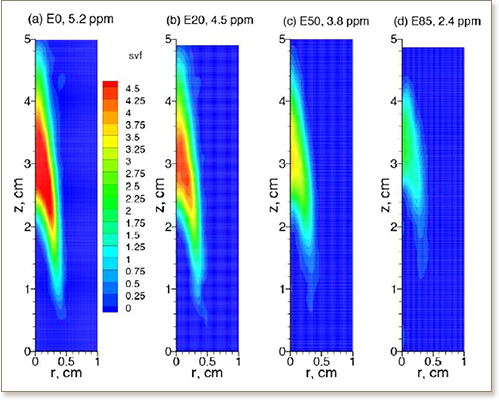Recent progress in gasoline surrogate fuels


Petroleum-derived gasoline is currently the most widely used fuel for transportation propulsion. The design and operation of gasoline fuels is governed by specific physical and chemical kinetic fuel properties. These must be thoroughly understood in order to improve sustainable gasoline fuel technologies in the face of economical, technological, and societal challenges. For this reason, surrogate mixtures are formulated to emulate the thermophysical, thermochemical, and chemical kinetic properties of the real fuel, so that fundamental experiments and predictive simulations can be conducted. Early studies on gasoline combustion typically adopted single component or binary mixtures (n-heptane/isooctane) as surrogates. However, the last decade has seen rapid progress in the formulation and utilization of ternary mixtures (n-heptane/isooctane/toluene), as well as multicomponent mixtures that span the entire carbon number range of gasoline fuels (C4–C10). The increased use of oxygenated fuels (ethanol, butanol, MTBE, etc.) as blending components/additives has also motivated studies on their addition to gasoline fuels. This comprehensive review presents the available experimental and chemical kinetic studies which have been performed to better understand the combustion properties of gasoline fuels and their surrogates. Focus is on the development and use of surrogate fuels that emulate real fuel properties governing the design and operation of engines. A detailed analysis is presented for the various classes of compounds used in formulating gasoline surrogate fuels, including n-paraffins, isoparaffins, olefins, naphthenes, and aromatics. Chemical kinetic models for individual molecules and mixtures of molecules to emulate gasoline surrogate fuels are presented. Despite the recent progress in gasoline surrogate fuel combustion research, there are still major gaps remaining; these are critically discussed, as well as their implications on fuel formulation and engine design.
DOI: 10.1016/j.pecs.2017.09.004

"KAUST shall be a beacon for peace, hope and reconciliation, and shall serve the people of the Kingdom and the world."
King Abdullah bin Abdulaziz Al Saud, 1924 – 2015
Thuwal 23955-6900, Kingdom of Saudi Arabia
© King Abdullah University of Science and Technology. All rights reserved